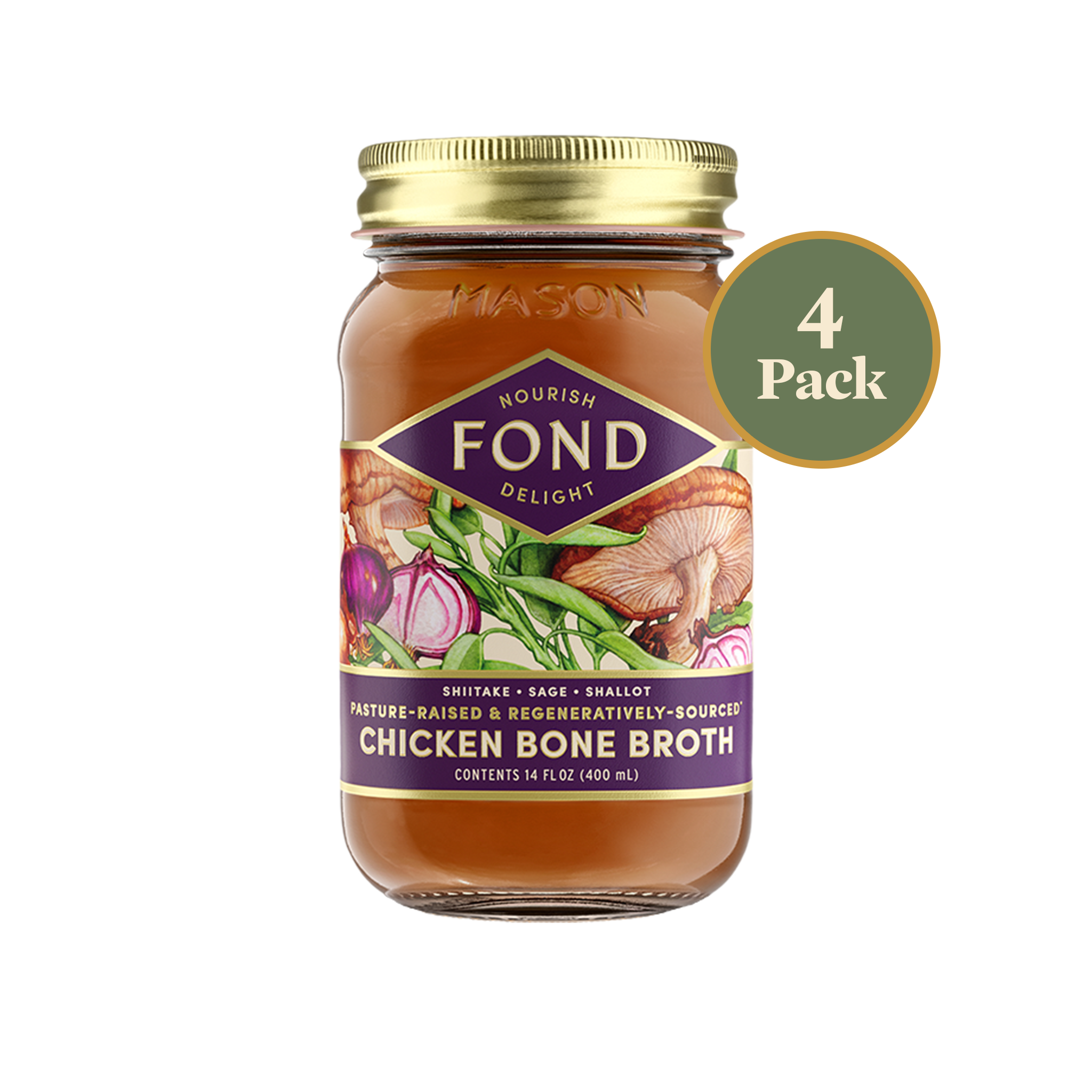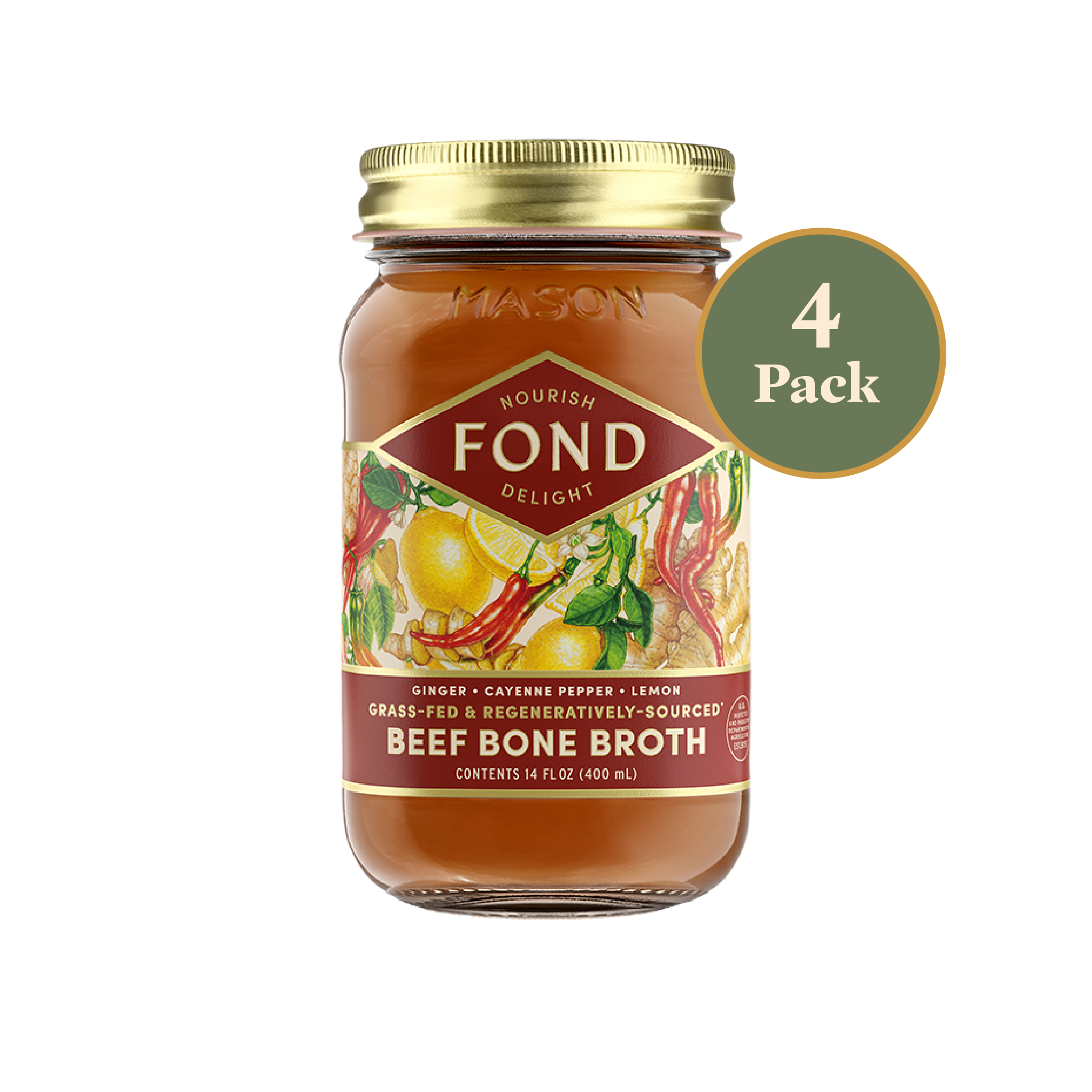Since May is Mental Health Awareness Month, we figure it's the perfect time to dive a little deeper into what a healthy lifestyle can mean for our mental health, and why bone broth is a key piece of the puzzle. We've already talked about anxiety and the gut-brain connection, so today we'll lean in to mental health and wellness and how we can support ourselves through diet and lifestyle.
what is mental wellness, anyway?
We've all heard about mental health, but mental wellness is a new take on the same idea. Essentially, it's the ability to cope with the normal stressors of daily life, as well as the ease with which you're able to function in your day-to-day through things like socializing, working, and taking care of yourself and others. Think of your mental wellness just like your physical wellness; it's incredibly important! And most of us don't focus on it enough.
A few key things have an influence on our overall mental and emotional wellness, and our physical health is one of them! The gut-brain connection is real. Taking care of your gut health can help reduce (and even eliminate!) anxiety, depression, mood swings, and more. While there is no shame in using medication to help manage your mental wellness, there are other changes we can make, too.
lifestyle changes for mental wellness
Thankfully, there are a whole lot of changes we can make in both our diet and overall lifestyle to improve our resilience when it comes to stress, anxiety, and overwhelm (2020 anyone?).
The first is to practice stress-management. In theory, this sounds great, but it's really hard in practice. While stress-management can include things like meditation, yoga, regular exercise, and taking time for yourself, it also includes setting healthy boundaries, standing up for yourself, and asking for help when you need it.
Movement is also key for improving your stress-response and overall resilience, as well as improving physical health. It's a one-stop-shop, really. In fact, regular aerobic exercise helps make our "fight or flight" response less reactive, helping to reduce anxiety in the process. But don't take our word for it! Here's what Srini Pillay, MD, a Harvard Health Publishing contributor, has to say:
When anxious people are exposed to physiological changes they fear, such as a rapid heartbeat, through regular aerobic exercise, they can develop a tolerance for such symptoms. Regular exercise such as cycling or gym-based aerobic, resistance, flexibility, and balance exercises can also reduce depressive symptoms. Exercise can be as effective as medication and psychotherapies. Regular exercise may boost mood by increasing a brain protein called BDNF that helps nerve fibers grow.
And finally, we can't forget about diet! It's one of the most important health pillars, and it can make a world of difference in overall mental wellness. Since there is such a connection between the gut and mental health, eating to optimize our gut health and bacterial balance will inadvertently improve our mental state, too. While there's no one-size-fits-all when it comes to the food we eat, there are some general pillars that can make a world of difference:
- Eat more veggies! Not only do they have key micronutrients important for cellular and overall health, but they also have fiber (including prebiotics!) to help keep you full and keep your digestive tract healthy. Think of prebiotics as little fertilizers that encourage the growth of (and help feed!) healthy bacteria in the gut. Since prebiotic fiber isn't digestible by our bodies, it passes through the digestive tract and acts as food for the bacteria that live there. This is a good thing!
- Try an elimination diet. If you know that your health needs a reset, but you're not sure where to start, an elimination diet can be the perfect solution. We love options like Whole30 or AIP. When following an elimination diet, you'll remove commonly inflammatory foods for 4-8 weeks, then reintroduce them one by one to see how they impact your health (both mentally and physically).
- Eat enough healthy fats. We know fats can sometimes be a controversial subject, but they shouldn't be! Our brains are even 60% fat, and contrary to popular belief, many times fat is actually the best source of fuel for our brains. Two particular fatty acids, arachidonic (an omega-6 fat) and docosahexaenoic (an omega-3 fat) play an integral role in brain health. The best options for healthy fats include grass-fed meats, wild-caught fish, coconut oil (MCT oil included!), extra virgin olive oil, avocados, olives, nuts & seeds, grass-fed ghee and butter, pasture-raised animal fats, and full-fat dairy.
- High-quality protein. While some think carbs can increase your mood and energy level, they often do the opposite. One 2019 systematic review that evaluated the impact of carb consumption on mood found that carbs were associated with increased fatigue and decreased alertness within 30 minutes of ingestion, but not increased mood. Instead, focus on high-quality protein to boost your mood! Options like organ meats, wild caught fish, oysters and shellfish, and other meats like beef, pork, and wild game all provide essential nutrients (like zinc, vitamins B6 and B12, iron, omega-3s, and more) that help combat depression and anxiety.
- Drink bone broth. This article is titled bone broth and mental wellness, after all! The nutrients in bone broth (like glycine, proline, l-glutamine, and more) help to promote overall gut health, heal the gut, and so much more. Don't worry, we're diving in deep below!
how bone broth supports gut health
We've talked extensively about how bone broth supports gut health before, so today we'll give you the abbreviated scoop.
Bone broth is FULL of valuable amino acids, collagen, gelatin, and trace minerals that your body craves. These are all fantastic for healing leaky gut, improving dysbiosis, and keeping your digestive tract in tip-top shape.
Bone broth is easily digested and soothing to the digestive system, unlike many other foods that can be difficult to fully break down. By regularly drinking bone broth or using it in recipes, you can help promote healthy gut integrity while reducing inflammation.
Let’s break down how:
- Collagen helps to nourish the intestinal lining and reduce inflammation. Plus, it’s easy for a damaged gut to digest and reap the benefits of its protein and minerals
- Gelatin is essential for connective tissue function. It literally acts to heal and seal the gut, making bone broth essential for those with chronic inflammation or leaky gut. Gelatin also absorbs water and helps to maintain the layer of mucus that keeps gut microbes away from the intestinal barrier.
- Glycine is an important amino acid that helps your body make proteins. It also helps reduce inflammation and protects against ulcers within your gut.
- Glutamine is a powerhouse for your cells, providing them with the energy they need! It also helps to maintain the integrity of the gut lining.
Collagen, gelatin, glycine and glutamine are nutrients that we simply don’t get enough of in our modern diets. Bone broth conveniently combines them all into one easy-to-sip package. If you suspect your gut health could use some help, add in 8-16oz of bone broth each day and see how you feel!
how bone broth supports brain health
Glycine, a key component in bone broth, has been shown to boost memory, help reduce stress, and improve mental clarity. It's also been shown to protect against neuronal death after strokes, and likely plays a large role in the development of the brain in utero and during the first few months of life.
Calcium, also a key component of bone broth, is essential for nerve conduction. In other words - once a nerve cell is stimulated, calcium then triggers neurotransmitter release, which allows the signal to be passed on to the next nerve cell. If you're deficient in calcium, this transmission is altered, which can lead to depression, insomnia, and hyperactivity. Chondroitin sulfate (you guessed it, found in bone broth!) is key for learning and memory, since it has a role in both regeneration and plasticity in the CNS (central nervous system!)
how bone broth supports mood and sleep
When it comes to mood and sleep, glycine is once again the superstar. As an inhibitory neurotransmitter, it can decrease anxiety, support feeling calm (couldn't we all use more calm in our lives?), and help with sleep. Here's Chris Kresser, functional medicine guru, with more on glycine:
Unlike methionine, glycine does not compete with tryptophan for transport across the blood–brain barrier. (72) Tryptophan is the precursor (raw material) for serotonin, a neurotransmitter that contributes to feelings of well-being. Serotonin, in turn, is a precursor to melatonin, a hormone that regulates sleep–wake cycles. This is why a diet that includes bone broth and fattier cuts of meat can help prevent the depression and beat the insomnia that some people experience when eating a diet high in methionine-rich lean meat and eggs.
Glycine also slows down the production of norepinephrine which induces feelings of anxiety. This can either decrease specific instances of anxiety, or lessen the intensity of the feelings when they do come on.
Have we convinced you yet? Are you ready to take your mental wellness to the next level with bone broth or other diet and lifestyle changes?














